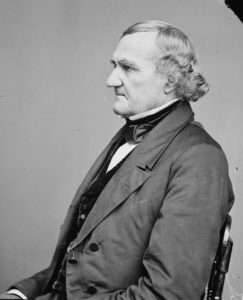The Volokh Conspiracy
Mostly law professors | Sometimes contrarian | Often libertarian | Always independent
Today in Supreme Court History: May 30, 1865
Editor's Note: We invite comments and request that they be civil and on-topic. We do not moderate or assume any responsibility for comments, which are owned by the readers who post them. Comments do not represent the views of Reason.com or Reason Foundation. We reserve the right to delete any comment for any reason at any time. Comments may only be edited within 5 minutes of posting. Report abuses.
Please to post comments



There aren't any older May 30 decisions because until 1971 it was always the date for Memorial Day
BNSF Ry. Co. v. Tyrrell, 581 U.S. --- (decided May 30, 2017): railroad could be sued in state where it was neither based nor incorporated nor where accident happened (IOW, under general "doing business" jurisdiction as allowed by state statute) despite Daimler AG v. Bauman, 2014, which held that "doing business" jurisdiction did not comport with due process, because 45 U.S.C. §56 allows suit against railroads in any "doing business" state which is only a venue and not a jurisdictional phrase (this is lame; I think the Court was trying to put a diaper on Daimler)
Esquivel-Quintana v. Sessions, 581 U.S. --- (decided May 30, 2017): "sexual abuse of minor" (a reason for deportation under the Immigration Act) presumes general federal law definition of minor (under age 16) rather than law of State of conviction (18) and therefore deportation order based on guilty plea as to 17-year-old girl overturned
Hildwin v. Florida, 490 U.S. 638 (decided May 30, 1989): Sixth Amendment (trial by jury) does not require that, after conviction, findings of fact authorizing death penalty be made by jury; judge can decide sentence after hearing jury's mere recommendations and is not bound by them
Deepsouth Packing Co. v. Laitram Corp., 406 U.S. 518 (decided May 30, 1972): it is not a patent infringement to sell parts of a patented invention (a shrimp deveining machine) to overseas buyers for assembly (abrogated by statute in 1984) (note White's flowery language which shows that as a writer he was a good football player)
Socialist Labor Party v. Gilligan, 406 U.S. 583 (decided May 30, 1972): no "case or controversy" as to contention by political party that Ohio's requiring loyalty oath for placement on ballot violated Equal Protection because of intervening change in election law, failure to allege injury or actual exclusion from ballot, and fact that party had repeatedly signed the oath in the past
In re Primus, 436 U.S. 412 (decided May 30, 1978): ACLU attorney who had given lecture to women who had been involuntarily sterilized and then sent letter stating that the ACLU would offer free legal assistance was protected by First and Fourteenth Amendment freedom of expression; disciplinary reprimand for "solicitation" vacated
Bernal v. Fainter, 467 U.S. 216 (decided May 30, 1984): Texas requirement that a notary be a United States citizen violated Equal Protection under strict scrutiny (no "compelling state interest" -- plaintiff was a resident alien)
Burns v. Reed, 500 U.S. 478 (decided May 30, 1991): prosecutor who obtained search warrant after advising police officers to question multiple-personality defendant under hypnosis (one of her other personalities was suspected of shooting her children) enjoyed prosecutorial immunity in 42 U.S.C. §1983 suit as to conduct at probable cause hearing but not as to advice to police (one of the personalities had been the one to make the initial call after the shooting) (it's unclear which of the personalities brought the §1983 suit -- how many "plaintiffs" had to be deposed?)
The Monday Holiday Act, separating the real holidays from the play holidays for over 50 years.
The multiple personality case brings to mind a pair of conjoined twin reality TV stars where each head had a separate legal identity. I imagine they could have fun with that in court. No, I wasn't driving, it was my twin.
Distantly related to the death penalty case, the top court in Canada recently ruled that parole ineligibility periods longer than 25 years are as unconstitutional as capital punishment. The prosecution had successfully argued in the trial court that the parole ineligibility periods for multiple offenses could run consecutively. This legal dispute mirrors the recent disputes in lower America about when minors must be allowed a chance at parole.